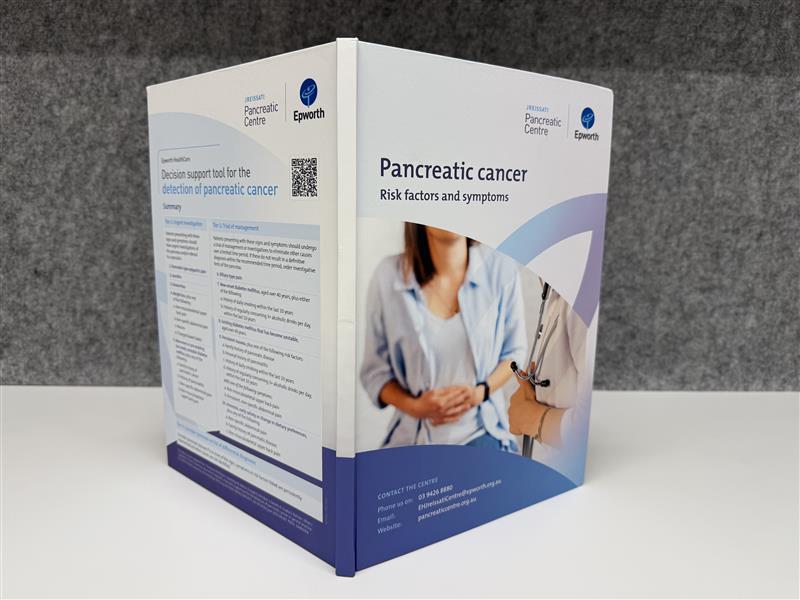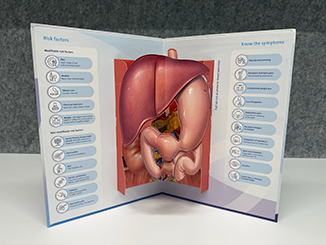The Jreissati Pancreatic Centre at Epworth is a centre of excellence in clinical care, patient experience and research. We are committed to improving early diagnosis of pancreatic cancer.
The symptoms of pancreatic cancer are non-specific and similar to symptoms of other less serious health issues. Studies have found that it often takes up to six visits to a GP with symptoms, before a patient receives a pancreatic cancer diagnosis.
A delay in diagnosis significantly impacts quality of life for patients and their families. If it’s not detected early, pancreatic cancer can advance and be harder to treat. For these reasons, the Australian Optimal Care Pathway for Pancreatic Cancer recommends early referral to a specialist physician, often before a GP has confirmed a diagnosis.
We want to partner with you to improve outcomes for your patients.
GP decision support tool
To help GPs diagnose pancreatic cancer earlier, a group of specialists in Australia have developed a decision support tool to assist investigations of those with increased risk of pancreatic cancer. The decision support tool helps to identify diagnostic pathways based on combinations of symptoms and risk factors.
Screening information for high-risk patients
You may consider a referral to the Jreissati Pancreatic Centre at Epworth for patients in high-risk families who may benefit from screening, and patients with pre-cursor lesions such as cysts.
The Jreissati Pancreatic Centre is leading the Australian Pancreatic high-Risk ScrEening (APRISE) Study in partnership with Pankind: Pancreatic Cancer Australia. The study is assessing whether regular screening can help detect pancreatic cancer earlier in people with a higher-than-average risk.
Screening in this study includes:
- A yearly MRI (magnetic resonance imaging) or EUS (endoscopic ultrasound) scan
- A brief yearly questionnaire about your patient’s health and medical history
Learn more about the eligibility criteria and how to refer your patients.
Please contact us for more information on 0418 370 684 or email [email protected]
This study is proudly funded by the Epworth Medical Foundation, Pankind: Pancreatic Cancer Australia, the Viridian Foundation, the Janko Inge Foundation, individual generous donors, and the Victorian Government through the Victorian Cancer Agency.
3D pop-up card of the upper gastrointestinal tract
This pop-out card has been designed to support GPs during consultations. It opens to display a 3D model of the upper gastrointestinal tract, with accompanying information on key symptoms and risk factors for pancreatic cancer.
A copy of the GP decision support tool is included on the reverse to assist with investigation and referral decisions.
To request a free copy as part of our GP education pack, which includes the 3D pop-up model, pamphlets, posters, and supporting other resources, contact us at [email protected] or call 03 9426 8880.
GI for GPs symposium - October 2025
Join us on Saturday, 25 October 2025 for a one-day event with leading specialists and researchers sharing current best practice across gastroenterology, upper GI surgery and oncology, including pancreatic cancer.
GI for GPs Symposium recording
2024 GI for GPs Symposium - Password: GIforGP2024
2023 GI for GPs Symposium - Password: GI2023

Check (RACGP)
Check is a continuing professional development (CPD) learning activity led by the Royal Australian College of General Practitioners (RACGP) and written and reviewed by expert clinicians and subject matter experts. Each unit comprises approximately five clinical cases with answers, followed by 10 multiple-choice questions, as well as references and resources.
Check aims to keep Australian GPs up to date with the most common and most important clinical conditions, providing up-to-date, relevant support to GPs in their clinical practice.
The Jreissati Pancreatic Centre at Epworth led the February 2024 edition of check, which focused on the investigation and management of pancreatic cancer.
Learning outcomes include:
- discuss the management of patients with pancreatic cystic lesions
- summarise the early signs and symptoms of pancreatic cancer
- outline the criteria for individuals who are at high risk of developing pancreatic cancer
- describe the investigations recommended for diagnosing pancreatic cancer
- list the red flags for pancreatic cancer that warrant early specialist referral.
GP pancreatic cancer information session
The GP Liaison team at Epworth hosts regular education events for GPs.
You can watch the December 2021 pancreatic cancer information session on demand. Gastroenterologist and Centre Director, Associate Professor Andrew Metz, with General Practitioner Dr Andrew Davaris discuss symptoms, risk factors, investigations, current treatment and how GPs can support patients during and post treatment.
Password: epworthgp
Patient information booklets
Share comprehensive information with your patients with our free patient guides:
Epworth Pancreatic Cancer Patient Guide
Epworth Pancreatic Cancer Patient Nutrition Guide
Know the symptoms poster
You can print the PDFs or guide your patients to www.pancreaticcentre.org.au
For printed copies of the guides or shorter booklets for your practice, please phone 03 9426 8880 or email [email protected]




